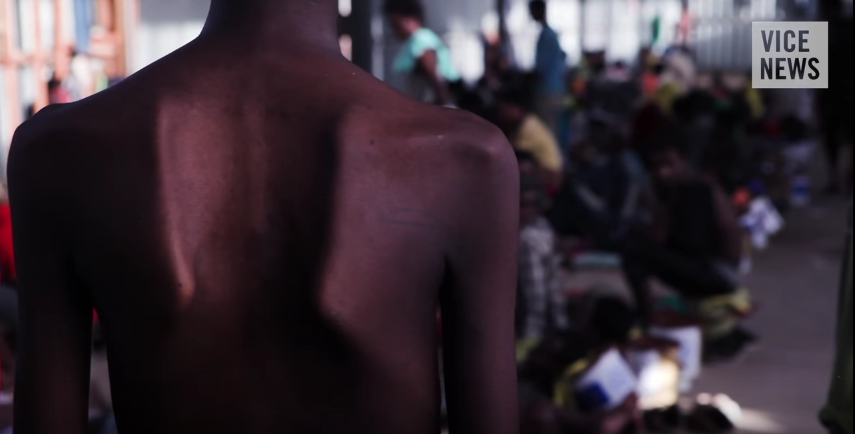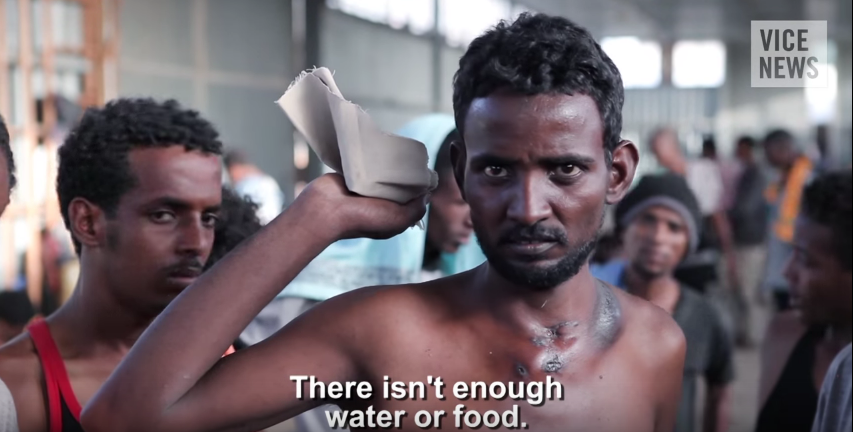The New Torture Camps for Eritrean Asylum-Seekers
The halt in operation of the Sinai torture camps has not stopped the abuse of Eritrean asylum-seekers. Thousands of Eritreans flee their homeland every month due to the dictatorial nature of the regime in Asmara and the indefinite forced-labor service all Eritreans must perform. Eritreans and other migrants and asylum-seekers are vulnerable to abuse and exploitation, as they travel through unknown lands with no legal protection.
Israel is home to 45,000 asylum-seekers, most of them (33,000) are Eritreans. According to our estimates at the Hotline for Refugees and Migrants, about 20% of the Eritreans in Israel survived the torture camps in Sinai. In these torture camps, local smugglers would imprison and torture Eritrean asylum-seekers to force their families to pay exorbitant ransoms.
According to Meron Estefanos, an Eritrean activist based in Sweden, around September 2014, these torture camps in northern Sinai stopped operating due to an indiscriminate counterinsurgency campaigned waged by the Egyptian regime, which disrupted the smugglers’ ability to conduct their cruel business. Estefanos, whose work was documented in the movie “Sounds of Torture”, regularly receives calls from Eritreans in torture camps and their relatives.
The phenomenon of kidnappings and torture for ransom of Eritreans and other African migrants has not stopped, but simply shifted to other countries. Those countries, Sudan and Libya, are characterized by a weak central government and they are areas of transit for asylum-seekers and migrants. Criminals and smugglers now operate torture camps in Libya and Sudan, where they abuse, rape, starve and force into slave labor asylum-seekers and migrants until their families are able to transfer the ransom money for them.

Eritrean torture survivor shows his back while being held in a militia-run detention facility in Libya. From this Vice News documentary.
Interviews with Eritrean asylum-seekers conducted in Rome by MEDU, an Italian human rights NGO, show that the average duration of the journey from Eritrea to Italy is 16 months, with an average five-months-stay in Libya. All Eritrean interviewees in Rome reported being abused in some form or another en route to Europe. “98% declared to have been deprived of food and water”, the MEDU report states.
Some of the refugees subjected to torture in Sudan are kidnapped by criminals as they rush across the border from Eritrea to Sudan or while they’re inside or in the vicinity of UNHCR-operated refugee camps in eastern Sudan. The kidnappers take the refugees to warehouses near Kassala and torture them to extract ransom from their families. According the MeronEstefanos, the kidnappings in east Sudan have increased in recent months. The sum of the ransom has also risen from about $3,500 to $15,000. Those who are known to have relatives in developed countries are ordered to pay $20,000. The torture includes beatings, burning, hanging, starvation and rape, especially of female refugees.
Asylum-seekers who pay smugglers to reach Libya, with their final destination being Europe, are often kidnapped inside Libya. Several kinds of criminals are involved in torturing and imprisoning asylum-seekers for ransom. Local gangs kidnap asylum-seekers en route to northern Libya in the Sahara desert. The kidnappers utilize the extreme harsh conditions in the Sahara desert as a torture method by depriving their captives of clean water or placing them under the sun until their family pays. According to Estefanos, another group involved in kidnapping asylum-seekers in Libya are nationals of Chad who raid points near borders where smugglers transfer asylum-seekers from one to the other. The Chadians then transfer their captives to warehouses near the border with Chad, where they asylum-seekers are tortured and raped until their relatives transfer the required ransom.

Eritrean torture survivor shows marks around his neck in a Libyan detention facility. Via Vice News
According to an Amnesty International report, at times the traffickers cooperate with criminal and hand their “clients” to criminal gangs. In other cases, it’s the smugglers themselves who take the asylum-seekers to isolated areas in the Sahara desert in Libya and keep their “clients” as hostages there.
Holding and torturing migrants for ransom are also common in the northern Libyan city of Ajdabiya and in the city of Sabha, in Western Libya, which are major transfer points for refugees and migrants en route to the Libyan coast. Amnesty reports: “In some cases where families were unable to pay the ransom, migrants and refugees were held captive for up to six months. Individuals interviewed by Amnesty International reported being beaten with objects such as wooden sticks, hoses, rifle butts, and iron bars; being subjected to electric shocks… and being given insufficient quantities of food and water.”
From Ajdabiya and Sabha, migrants continue toward the coast, but are often subjected to torture and captivity again. In one such route, after being held for ransom and tortured in Ajdabiya, migrants are taken through ISIS-held territory in closed containers to prevent their capture to the town of Bani Walid in north-western Syria. If ISIS discovers the migrants, the kidnap the Christians among them and often behead them later on. In Bani Walid, migrants are often held and tortured for another sum to be paid to the smugglers by relatives. After the ransom is paid in Bani Walid, migrants are taken to an area near the sea where they await departure. In those compounds they receive little food and are often beaten and raped, sometimes for additional ransom sums.
The changes in routes of human trafficking and the “relocation” of torture camps from Sinai to Sudan and Libya make it clear that this horrific phenomenon is far from over. Torture will not stop as long as weak and corrupt regimes will continue tolerating the existence of torture camps on their soil, and Isaias Afawerki will continue to repress his people. Traffickers and torturers will continue to exploit the victims of the Eritrean regime and torture them in an attempt to extort large sums of ransom from their relatives who’ve already made it to safety.
By Elizabeth Tsurkov
